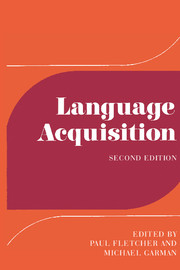Book contents
- Frontmatter
- Contents
- Contributors
- Preface
- Part I Contexts and determinants
- Part II The development of linguistic systems: phonology
- Part III The development of linguistic systems: grammar
- Part IV Later language development
- Introduction
- 21 Some fundamental aspects of language development after age 5
- 22 The development of reading: the acquisition of a cognitive skill
- 23 Language acquisition and writing
- Notes to chapters
- Bibliography and citation index
- General index
- Titles in the series
Introduction
Published online by Cambridge University Press: 05 June 2012
- Frontmatter
- Contents
- Contributors
- Preface
- Part I Contexts and determinants
- Part II The development of linguistic systems: phonology
- Part III The development of linguistic systems: grammar
- Part IV Later language development
- Introduction
- 21 Some fundamental aspects of language development after age 5
- 22 The development of reading: the acquisition of a cognitive skill
- 23 Language acquisition and writing
- Notes to chapters
- Bibliography and citation index
- General index
- Titles in the series
Summary
It has been commonly understood, since Carol Chomsky's (1969) groundbreaking study, that language development is not nearly as complete by the age of 5 years as had previously been thought. However, there are two ways of interpreting Chomsky's demonstration of continuing difficulties in comprehension of certain predicate constructions after 5. One way is to see the upper bound of language development as simply being pushed higher; but another is to regard 5 still as a ‘frontier age’, in Karmiloff-Smith's words (Chapter 21), while changing one's view of what sorts of territory the frontier divides. Karmiloff-Smith suggests that while it would indeed be wrong to continue to interpret it as a demarcation of basic versus complex structures (within the older, exclusively structuralist approach), it does seem to represent a frontier with respect to three other contrasts: surface-behavioural phenomena versus their underlying representations (including here the simpler, more basic categories that used to be thought of as ‘acquired’ before 5); within-sentence versus between-sentence developments (i.e. discourse structures starting to emerge after 5); and contextualized versus decontextualized mastery of language performance (i.e. the ability to manipulate language in its own right, including the ability to reflect metalinguistically on its formal properties, in an increasingly adult-like fashion.
Karmiloff-Smith reviews a wide range of studies carried out since Chomsky (1969), concentrating on what she refers to as the linguistic challenge to the older view.
- Type
- Chapter
- Information
- Language AcquisitionStudies in First Language Development, pp. 451 - 454Publisher: Cambridge University PressPrint publication year: 1986



